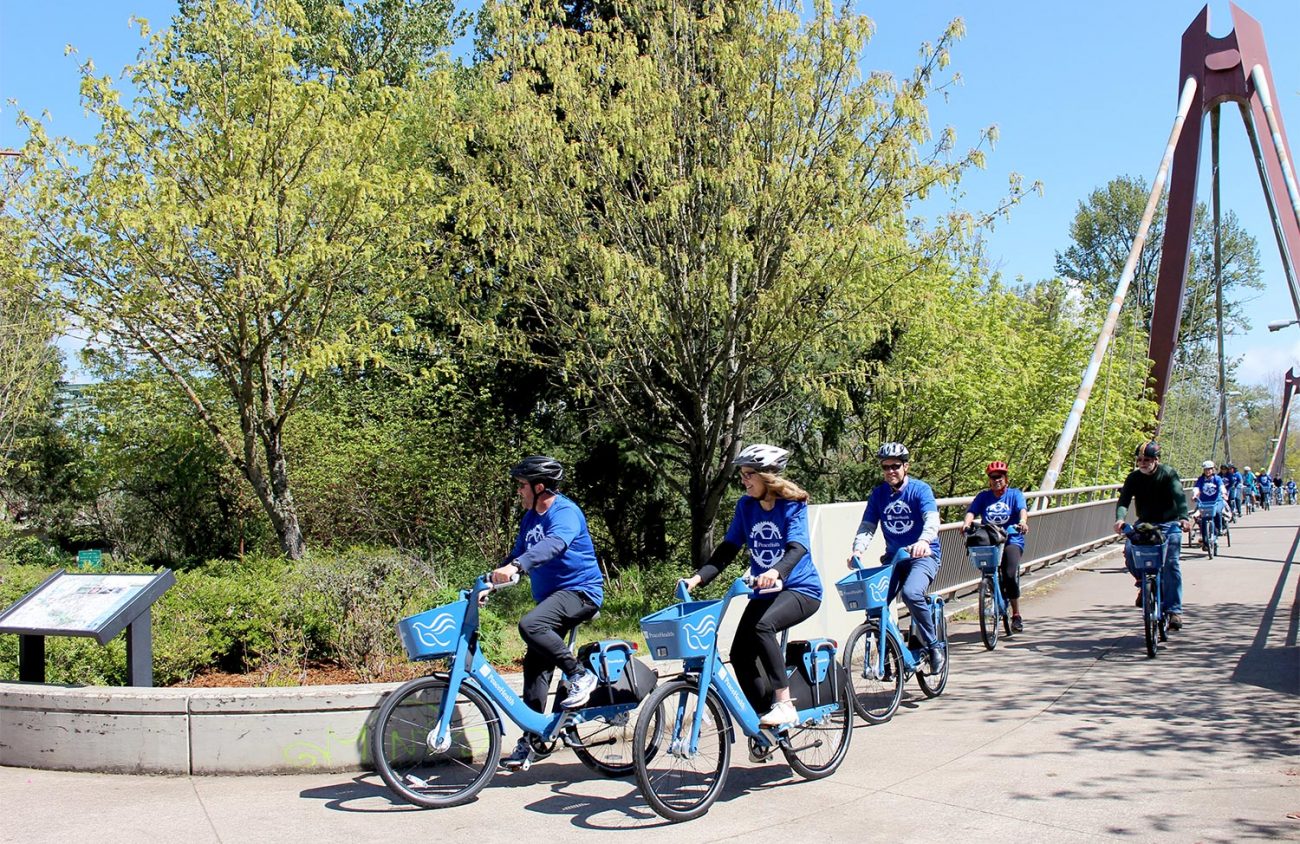Inside Cascadia Mobility’s Eugene office, bicycles are the center of attention. Bicycle rims are on the walls with photos of staff tucked into spokes, mountain bikes are hanging on the wall awaiting the weekly staff trail ride and about 30 of Eugene’s blue PeaceHealth bikes are awaiting repairs before heading back out to the street.
Cascadia Mobility was formed in 2020 as a way to run bike share programs that were closed down earlier by large corporations. Rather than looking for a new corporation to run the bike share program they lost, mid-size Oregon cities suggested a third party nonprofit, leading to the creation of Cascadia Mobility. The group currently manages the city of Eugene’s PeaceHealth Rides, and it wants to expand its services and is looking to restore other bike share programs in other mid-size cities and offer them with equity in mind.
“We’re trying to become what I’d call a microtransit agency for micromobility,” says Cascadia Mobility CEO Brodie Hylton, who’s managed bike share programs for the past decade. Just as buses and trains are run by public agencies, he says the nonprofit’s vision is to be the small and nimble organization that can help municipalities figure out how to provide transportation options such as bicycles, e-bikes, scooters and more.
In 2020, Uber shut down its Social Bicycle, which operated the Eugene-owned PeaceHealth-sponsored bike share program, and Zagster also closed down, affecting Salem, Corvallis and Bend, says Stephanie Millar, transportation options program manager with the Oregon Department of Transportation. “They left the equipment locked on the street, and the cities were not sure what to do next,” she adds.
Millar says she offered to bring together different parties via Zoom to discuss the future of bike share in Oregon, how to make it cost efficient and reliable in markets smaller than Portland and meet community needs.
“All of the government entities talked about difficulties they had faced running a system and that a third party nonprofit was a good model,” she says. “It became apparent that a statewide nonprofit could handle things at scale and bring needed specialty expertise.”
Cascadia Mobility organized shortly afterward. In 2020, the group formed underneath the larger Portland-based transportation-oriented nonprofit called Forth (Cascadia plans to become an independent nonprofit in 2022). Hylton applied and won a $160,000 grant from ODOT’s Transportation Options Innovation program, which he says is helping Cascadia Mobility expand its reach with Oregon cities.
Cascadia’s sole contract is with Eugene’s PeaceHealth Rides program. The nonprofit won the contract in 2021.
Hylton says Eugene has the goal of expanding the bikeshare program, and that he’d like to see Springfield join. The economics of running a micro-transit program in a mid-size city is difficult, Hylton says. So the nonprofit hopes to help cities like Corvallis and Bend figure out how to provide shared transportation, such as bike share programs.
“We can help cities realize what’s the right mix of vehicles, the right brand or modes that might work well and the true costs to operate the equipment,” he says. “And sharing that information city-to-city to allow us to consolidate and centralize our operations and make the cost lower.”
Ownership of bikes — or scooters — will vary, ranging from a public entity to a group of community agencies, Hylton says, but Cascadia says its services would include repair, administration and marketing of the program. And acting as the face of the bike share program, it shows users that the organization isn’t an out-of-state entity like Uber, he adds.
“If citizens in the community know that their shared transportation program is run as a public benefit, as a nonprofit, that program is more likely to succeed,” Hylton says. “Scooters are less likely to be vandalized or thrown in the river.”
Being a nonprofit allows Cascadia Mobility to offer more equity for its rentals, says operations director Al Hongo. As a nonprofit, Hongo says its first priority isn’t profit, so it’ll be able to offer lower charges for low-income riders.
The normal rate for riders is $15 a month, but the nonprofit will soon offer a $3 per month rate for users who are on social services, such as unemployment or food assistance, Hylton says.
Equity is also a part of planning where to install new bike hubs, where users can find a bike to rent, Hongo says. Rather than increasing the number of bikes in south Eugene, where there are more riders, he says the nonprofit would consider expanding the bike share program’s presence where residents don’t own bikes, and place them in west Eugene or near apartments.
“We are serving our people,” he says. “It forces us to make decisions based on things that aren’t profitable, but what’s right.”
In Eugene, Cascadia Mobility has expanded its bicycle operations, including valet services at events. Hongo says he wants to see the nonprofit work toward establishing a community-run bike shop in town, similar to ones in Portland and San Francisco. “You go to any town with tie-dye and Birkenstocks, and you have some funny place where really nice people help others get on bicycles,” he says. “We just don’t have anything like that here.”
Learn more about Cascadia Mobility at ForthMobility.org/CascadiaMobility, and about the PeaceHealth Rides (and how to avoid fees when parking your bicycle) at PeaceHealthRides.com.
